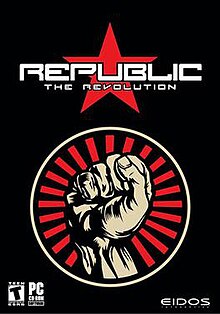Republic: The Revolution
| Republic: The Revolution | |
|---|---|
 | |
| Developer(s) | Elixir Studios Feral Interactive (Mac OS X) |
| Publisher(s) | Eidos Interactive (Windows) Feral Interactive (Mac OS X) |
| Director(s) | Demis Hassabis |
| Producer(s) | Adrian Bolton |
| Designer(s) | Demis Hassabis |
| Artist(s) | Wayne Kresil |
| Composer(s) | James Hannigan |
| Engine | Totality Engine |
| Platform(s) | Windows, Mac OS X |
| Release | 27 August 2003 |
| Genre(s) | Strategy |
| Mode(s) | Single player |
Republic: The Revolution is a video game produced by Elixir Studios, founded by Demis Hassabis,[1] a former programmer of Lionhead Studios and published by Eidos Interactive. It has since been released for the Mac OS X by Feral Interactive.[2] It is a depiction of grassroots political action, where one attempts to put their preferred government in power. It is set in Novistrana, a small, fictional, post-Soviet country in Eastern Europe. A sequel to the game had been announced by Elixir Studios shortly before its liquidation.[3] Subsequently, Rebellion Developments purchased rights to the game.[citation needed]
Gameplay[]
As a strategy game, the 3D game engine is mostly a facade on top of simpler rules and mechanics reminiscent of a boardgame. The 3D engine provides a high level of detail and helps 'flesh out' the world of Novistrana, enabling players to take a virtual tour of their current location. However, the overall influence of the 3D engine on the actual mechanics of gameplay is minimal - the ability to view actions taking place does not affect the outcome of those actions. Some actions carried out in the game offer extra customization options in the 3D view (for instance, choosing the approach for canvassing or allocating 'cards' in negotiations) but these are separate to the 3D world.
The game is divided into Days, each of which is a cycle of a Morning, Afternoon, and Night. Each of these periods is a turn of sorts, in which orders may be given to faction members to be carried out in the next available turn. Every morning force, influence, and wealth, the in-game resources, are collected.
Setting[]
The game is set in Novistrana, a fictional Soviet breakaway state highly reminiscent of other recently post-Soviet countries in the design of its buildings and the naming of its streets and suburbs. Game characters speak a fictional language reminiscent of Ukrainian or Russian. The population is largely Slavic, and the country's churches are Eastern Orthodox. Novistrana is rife with political turmoil, with many differing political forces vying for power representing a range of ideologies. The ideologies of Novistranans are generally influenced by their class or career. Police brutality and political corruption are prevalent.
Novistrana has its own national anthem, which is sung in a fictional language. Similarly, the alphabet used in Novistrana is fictional although it draws heavily from the Cyrillic alphabet. "Novistrana" can be translated in Russian and some Eastern European/Slavic languages as "New Country". In other Slavic languages it could be translated as "New Party".
Development[]
Expectations ran high for the game prior to its release, due to its unique concept and the possibilities it was to offer in terms of gameplay. Some preview sources claimed that the game would be better than Grand Theft Auto III. As development continued, however, Elixir simplified many of the game's political features. Commenting on these and other changes, PC Gamer observed of Republic in its 2003 "Mega Preview" that what started as a "massively ambitious game of political machinations in Eastern Europe... has been cut back to something a little more achievable in the human lifespan" (PC Gamer, April 2003).
Reception[]
Critical reception was lukewarm. GameSpot gave the game a 6.9/10, saying that the "Overly linear missions and noninteractive 3D action" hindered the "deep political strategizing of Republic's later levels." Other reviewers shared similar sentiments; IGN gave the game a 7.2/10, PC Gamer rated it at 80/100, and PC Zone provided the highest rating at 88/100. Based on 21 reviews, Metacritic gave it a rating of 62/100 ("Mixed or average reviews").[4]
Score[]
The BAFTA-nominated score for the game was composed by James Hannigan.
References[]
- ^ Game plays politics with your PC, BBC, Alfred Hermida, 3 September 2003 [1] retrieved 29 April 2011
- ^ Released on good behaviour...Republic makes it into US [2] retrieved 14 January 2014
- ^ Rausch, Allen (2005-02-22). "Elixir and Nicely Crafted Entertainment Announce Republic Dawn: The Chronicles of the Seven". GameSpy. Retrieved 2020-08-08.
- ^ "Overview over Republic: The Revolution reviews". Metacritic. Retrieved 2007-07-02.
External links[]
- 2003 video games
- Eidos Interactive games
- MacOS games
- Windows games
- Video games developed in the United Kingdom
- Video games scored by James Hannigan
- Video games set in Russia
- Video games set in Ukraine
- Video games set in Europe
- Feral Interactive games